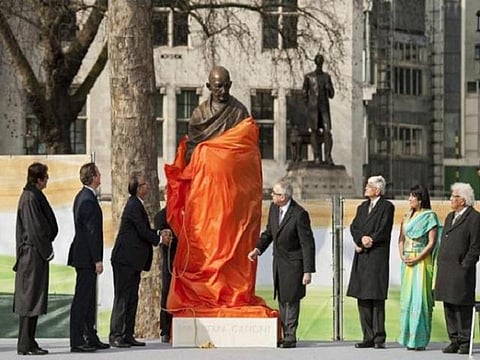
- Home
- न्यूजग्राम
- NewsGram USA
- India
- World
- Politics
- Entertainment
- Culture
- Lifestyle
- Economy
- Sports
- Sp. Coverage
- Misc.
- NewsGram Exclusive
- Jobs / Internships

By Harshmeet Singh
One of the biggest news of this week was the unveiling of Mahatma Gandhi's statue in Britain's famous Parliament square. The 9 foot tall bronze statue is ironically dedicated to the group of people he stood against – the loyal servants of the British Empire. Funded by the Gandhi Statue Memorial Trust which was founded by Meghnad Desai, the statue was given shape by the famous British sculptor Philip Jacksonn.
When the British PM David Cameroon was unveiling his statue in the presence of Arun Jaitley, Amitabh Bachchan and Gopalkrishna Gandhi (Gandhi's grandson), Bapu was being gazed at by his old nemesis, Winston Churchill.
Unveiled on the occasion of completion of 100 years of Gandhi's return to India from South Africa, the magnificent statue would be in an esteemed company of Sir Robert Peel, Nelson Mandela, Abraham Lincoln, Winston Churchill and a number of other former British PMs.
Gandhi & Churchill
It is hard to imagine the installation of Gandhi's statue going too well with Churchill, considering that the latter was a staunch opponent of everything Gandhi stood for. In 1931, Britain invited Gandhi to hold peace talks. Gandhi saw no reason to change his attire before attending the important meeting with the Viceroy. Not impressed with Lord Irwin's decisions to carry on negotiations with Gandhi to ensure a political truce in India in 1931, Churchill remarked "It is alarming and also nauseating to see Mr. Gandhi, an Inner Temple lawyer, now become a seditious fakir of a type well known in the East, striding half-naked up the steps of the Viceregal Palace, while he is still organizing and conducting a defiant campaign of civil disobedience, to parley on equal terms with the representative of the King-Emperor. I am against these conversations and agreements between Lord Irwin and Mr. Gandhi. . . The truth is that Gandhi-ism and all it stands for will have to be grappled with and finally crushed."
True to his image of remaining calm, Gandhi sent a letter to Churchill with the following words –
"Dear Prime Minister,
You are reported to have a desire to crush the simple 'Naked Fakir' as you are said to have described me. I have been long trying to be a 'Fakir' and that naked — a more difficult task. I, therefore, regard the expression as a compliment though unintended. I approach you then as such and ask you to trust and use me for the sake of your people and mine and through them those of the world.
Your sincere friend,
K. Gandhi"
Despite Churchill's evident animosity towards him, Gandhi wanted to meet him when he was in London for the second round table conference, a request which Churchill refused. Churchill's imperialistic approach was never in line with Gandhi's democratic values. Churchill was ever so against the labour party's decision to grant independence to India. The massive bloodshed during the partition gave him a reason to remind everyone of his views, saying "The fearful massacres which are occurring in India are no surprise to me."
Never the one to hide his likes and dislikes, Churchill was all praise for Jawaharlal Nehru and called him "Here is a man who has conquered both hate and fear." A smartly dressed diplomatic Nehru was always going to be more pleasing to the eyes of Churchill. After the death of Mahatma Gandhi, condolences poured in from all across the world, excluding Churchill. Although he had gone a bit softer on Gandhi after he was ousted from the post of British Prime Minister, he could never like Gandhi enough.
Gandhi's statue at the Parliament Square has intentionally been made slightly smaller in height than most of the statues already present in the area, indicating his will to be considered a common man. With Gandhi and Churchill sharing the same home now, let's hope they finally become friends!
